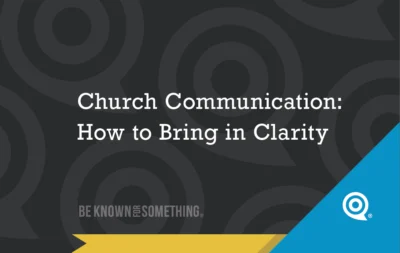Church Communication Must Show You Care (Here’s How)

I recently spoke to a church about effective church communication. In my talk, I reminded the congregation that Jesus told His disciples that we’re to be known for loving those around us.
However, when the world is asked about the Church, most of them know what we’re against (and not for love and caring). We’ve become really good at being salt while our “light” skills haven’t broken through. Dare I say that the church has hidden our lights under a salt-flavored bushel basket? It’s always easier to become known for what we’re against, than it is to be known FOR something.
This elicited a lot of questions from the congregation as they stayed for an hour after the service asking me questions about how they can be known for love.
Church communication must tackle this since it’s the voice of ministries to our communities (and not just an internal reminder voice to our congregations). The test? Do our non-church members in our communities know we care? How about our members? Both must feel it.
Here’s how to truly care for a group (as God’s called us to) using communication:
- Identify, know, and love your audience. The best way to do this? Look at your demographic numbers (internally and externally) and get a clear understanding of the groups within your reach. Which ones are growing and which aren’t represented (but should be). Get to know them. Truly understand their needs, concerns, and goals. The more you know, the more you should want to help them. To love them (as Christ does). Fall in love with the people God’s placed around you.
- Know how they receive love and caring. Dr. Gary Chapman’s book, “5 Love Languages”, defines the ways we receive love from others. Are you attempting to communicate love and caring in all 5 ways? Do you give them things, serve them, encourage them, spend time with them, and for those wanting it, giving them a handshake or a hug? We need to have a spectrum of caring.
- Make communication about them, not you. Many of us like to talk about what interests us. But that often can feel promotional and boring to others. Want to engage a group of people and have them wanting more? Make all your communication about them. If the focus feels like you care for them, they’ll receive it willingly.
- Stop pushing when they should be pulling. The sign of caring communication? People will reach out for it because they want it. If you feel that your church continuously pushes content and you constantly wonder if it’s being received, then you’re making it too much about your ministries and events and not about the people it’s intended for. Rework your communication and make sure it clearly identifies who it’s for, what it’s solving, and delivers something in a manner that will be received. And desired!
Want 25 Game-Changing Resolutions?
Related Posts

Church Communication: How to Bring in Clarity
In the new year, pastors often set goals. They want to grow attendance, launch new ministries, or strengthen discipleship. However,

Church Branding: Why Every Church Is Known for Something
Everyone is known for something, including your church. This is the heart of church branding. The real question isn’t whether

Church Welcome Video Tips Every Pastor Should Use
Your church welcome video is often the first message people experience before they ever step into your building. Long before

